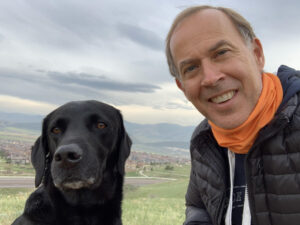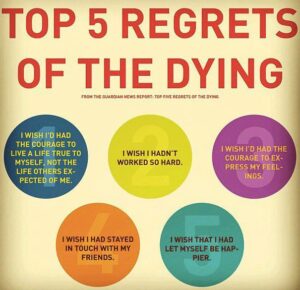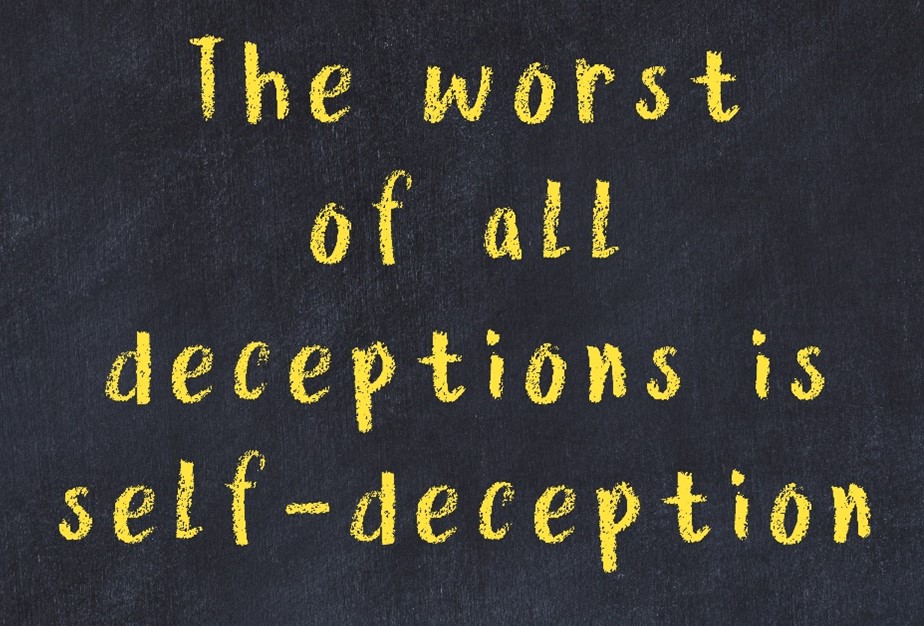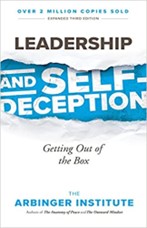Article Summary:
Many of us lack authentic alignment in our life and work. We don’t have a good fit between who we are and how we live. On the problem with lacking authentic alignment, why it happens, and what to do about it.
+++
Are you being true to yourself? Is there a good fit between how you live and who you really are? In other words, do you have authentic alignment in your life?
If you’re living in authentic alignment (1), there’s a good match between your inner world of your thoughts, hopes, and dreams and the outer world of what you’re doing with your life. There’s coherence between your core values, beliefs, priorities, and actions. With authentic alignment, you’re more likely to have not only physical but also mental, emotional, and even spiritual health and wellness.
There’s great power in the integrity of what author Kevin Cashman calls “total congruence” between who you are and what you do. As well as in the wholeness of what educator and author Parker Palmer calls “an undivided life.”
“A happy life is one which is in accordance with its own nature.”
-Lucius Annaeus Seneca, ancient Roman Stoic philosopher
The Problem of Lacking Authentic Alignment in Your Life
There are many instances in which we can see the problem with misalignment. If your car tires are out of alignment, for example, you can have poor handling, uneven tire wear, reduced fuel efficiency, and suspension problems. What happens when the players on a team are all over the place instead of acting as a disciplined unit? How will it go if a married couple isn’t on the same page about children and finances? What happens to organizations when they’re not aligned?
There’s also a cost to lacking authentic alignment in your life. When it’s missing, you tend to:
- spend a lot of time doing things you don’t really want to do
- feel inauthentic, like a fraud
- fall into the trap of people-pleasing
- feel stuck in your life or work
- feel sad or disappointed that you’ve given up on yourself or your dreams
- risk forgetting who you truly are because you’ve been pretending to be something you’re not for so long
- be disconnected or cut off from yourself, making you feel off kilter
- suspect that you’re going through the motions of life
- be anxious, frustrated, or overwhelmed more often
- feel lethargic or exhausted
What’s more, misalignment undermines your ability to do good work and perform at your highest levels.
“…there can be no greater suffering than living a lifelong lie….
in the end what will matter most is knowing that we stayed true to ourselves.”
-Parker Palmer, educator and writer
Why We Do It
Lacking authentic alignment is common. But why? There are many factors that can disrupt the rhythm of marching to the beat of your own drummer, as the expression goes. For example, you may drift away from your core because you:
- don’t know who you are (or have forgotten it)
- feel a need to please others or feel beholden to other people’s expectations
- take too many things on because you’re overambitious about what you can do
- feel trapped in commitments you’ve made in the past
- have become a prisoner of success, perhaps due to an excessive need for recognition
Sometimes, an external shock can create misalignment. It can be moving to a new community, losing a job, having a health crisis, or losing a loved one.
Benefits of Authentic Alignment
When you’re playing your own tune in life, it can bring you many benefits, including:
- a sense of wellness, including inner peace and harmony
- more freedom
- more balance in your life
- a sense of gratitude
- more joy
- a sense of fulfillment
When you have authentic alignment, you’re more likely to feel content and secure. You’re better able to move on and let go of things that aren’t good for you. And you’re able to tap into your inner voice and intuition.
With authentic alignment, you’re also better at setting boundaries and bolder in doing the things you really want to do. You’re likely to develop and maintain better relationships because you’re no longer hiding yourself. People will get to know the real you as you show up in the world with more honesty and vulnerability, in turn fostering connection and intimacy. You’ll tend to attract people who are a better fit for you in things like friendships or romantic relationships.
When you have authentic alignment, you don’t fret about wasting time because you’re intentionally engaging in good things in your life. This can help you move from a vexing sense of doubt about whether you’re living well to a sense of clarity, satisfaction, and serenity.
Living in authentic alignment can bring you a sense of profound satisfaction, with no need to keep chasing things because you already feel whole. Finally, it can help you avoid the common regret of living your life according to other people’s expectations instead of a life true to yourself.
“Of all of the regrets and lessons shared with me as I sat beside their beds, the regret of not having lived a life true to themselves was the most common of all. It was also the one that caused the most frustration” (since their realization came too late)…. “It is a pity that being who we truly are requires so much courage, but it does. It takes enormous courage at times.”
-Bronnie Ware, The Top Five Regrets of the Dying
How to Create and Maintain Authentic Alignment
How to go about creating more authentic alignment in your life? Here are 14 approaches:
1. Develop your self-awareness. Know yourself so well and deeply that you feel a sense of clarity and comfort about who you are and what makes you tick, helping you feel more comfortable in your own skin.
2. Strip away your ego, pride, and ambition. Set aside the expectations of others. Tap into your heart instead of your ego.
3. Remove your mask in front of those you love the most, deepening connection. Stop pretending to be something you’re not. Let them see the real you and invite them to reciprocate.
4. Explore the root causes that led you to want to avoid being yourself. Perhaps it was outside expectations? Or fear of judgment or failure? Fear of rejection, or of being hurt? Afraid to be seen for who you truly are? Sometimes, your life may be overly full, cluttered with too many commitments and too much “busyness.”
5. Return to your center by finding or creating sanctuary in your life. Sanctuary is a place or practice of peace in which you can leave the distractions, interruptions, and chaos behind and be present in silent, deep reflection. It could be a quiet room at home, a place of worship, or a quiet and solitary spot in nature.
6. Notice when you’re becoming misaligned. Pay attention to how you’re feeling. Is it frustration? Shame? Something else? Tune into your body and your emotions. Also, pay attention to the situations where it’s common: what are you doing and who are you with? See if there are patterns.
7. Practice disciplined self-care regularly. It’s easy to become misaligned when you’re tired, overworked, or burned out. Maintain healthy habits and rituals so you don’t fall into traps that get you out of alignment.
8. Discover your core values. Your values are what you consider most important in life, what’s most worthy and valuable to you. Are you living in accordance with your values?
9. Discover your strengths. What are the things you’re good at and that make you feel powerful when you’re engaging in them? Make sure that you’re using them often.
10. Discover your passions. What are the things that consume you with palpable emotion over time? How can you integrate them into your days more often?
11. Discover your purpose. Think about why you’re here and what feels purposeful and meaningful to you. Are you living purposefully? This can be a tough one for people. Author Richard Leider points out that there are two types of purpose. First, is a “BIG P” Purpose (a noble cause or something you can dedicate your life to). But you can also have a “little p” purpose (daily choices of how to contribute to others). Leider notes that “little p” actions are just as worthy. Also, they can add up over time into something potent.
12. Craft a vision of the good life. Think about how you want to live. What’s a bold and vivid picture of that? Make sure you’re working toward living it.
13. Be vigilant in declining activities that aren’t a good fit while agreeing to ones that are in alignment. When opportunities and requests come your way, do you have a good way to screen them? Without some sort of criteria or filter, you can end up with days filled with things are far afield from what you want to do.
14. Pay attention to when you need to interrupt the pattern and make a more radical shift. In a Harvard Business Review article, Donald Sull and Dominic Houlder point out that you may need to break the cycle with a catalyst like a course or sabbatical so you can spot unhealthy patterns and give yourself time to make needed changes.
Conclusion
Though authentic alignment may sound straightforward, it’s common for people to drift out of alignment.
It’s essential to be honest with yourself. If you can’t admit to yourself that you’re out of alignment, you’re unlikely to get it back.
It won’t help if you’re too hard on yourself when you drift. A little self-compassion can go a long way. Misalignment is common. If you find yourself judging yourself harshly and engaging in negative self-talk, change the channel and flip toward ideas for how to bring alignment back into your life.
It’s also important to have your own back. Go to bat for yourself just as you would your best friend. Finally, recall that authentic alignment is an ongoing process. Expect to have ups and downs. That’s okay, as long as you work to bring it back when you drift.
Wishing you well with it, and please reach out if you think I can help.
–Gregg

Tools for You
- Traps Test (Common Traps of Living) to help you identify what’s getting in the way of your happiness and quality of life
- Quality of Life Assessment to help you discover your strongest areas and the areas that need work and then act accordingly
- Leadership Derailers Assessment to help you identify what’s inhibiting your leadership effectiveness
Related Articles & Resources
- “Are You Pretending to Be Something You’re Not?”
- “The Trap of Caring Too Much about What Other People Think”
- “The Conformity Trap”
- “Why You Should Do an Annual Life Review–And How“
- “Thriving amidst the Chaos and Uncertainty: 12 Tips“
- Donald Sull and Dominic Houlder, “Do Your Commitments Match Your Convictions?” Harvard Business Review, January 2005
- Parker Palmer, A Hidden Wholeness
- Parker Palmer, “Living an Undivided Life” video
- Bill George, True North: Emerging Leader Edition
- Brene Brown, The Gifts of Imperfection
- Kevin Cashman, Leadership from the Inside Out
- Derek Wolcott, “Love After Love” (poem)
Postscript: Inspirations on Authentic Alignment
- “To thine own self be true.” -William Shakespeare, English poet, playwright, and actor
- “To be nobody-but-yourself—in a world which is doing its best, night and day, to make you everybody else—means to fight the hardest battle which any human being can fight; and never stop fighting.” -e.e. cummings, poet, painter, and playwright
- “I know who I am. The more we try to be something we’re not, the less successful we’ll be…. I don’t care what I do as long as I adhere to certain values.” -Jael Kampfe, from our LIFE Entrepreneurs interview
- “Some time when the river is ice ask me mistakes I have made. Ask me whether what I have done is my life.” -William Stafford, from his poem, “Ask Me”
- “I think I’ve always had a strong sense of who I am, but allowing myself to be that person is more recent.” -Bridget Bradley Gray, from our LIFE Entrepreneurs interview
- “Being true to who you really are can be one of the hardest things to do in life.” -Carlii Lyon, Australian executive
- “Even if all these needs are satisfied, we may still often (if not always) expect that a new discontent and restlessness will soon develop, unless the individual is doing what he is fitted for. A musician must make music, an artist must paint, a poet must write, if he is to be ultimately happy. What a man can be, he must This need we may call self-actualization.” -Abraham Maslow, psychologist
- “The thing that is really hard, and really amazing, is giving up on being perfect and beginning the work of becoming yourself.” -Anna Quindlen, writer
- “…the secret of career satisfaction lies in doing what you enjoy most. A few lucky people discover this secret early in life, but most of us are caught in a kind of psychological wrestling match, torn between what we think we can do, what we (or others) feel we ought to do, and what we think we want to do. Our advice? Concentrate instead on who you are, and the rest will fall into place.” -Paul D. Tieger, Barbara Barron, and Kelly Tieger, Do What You Are
- “I can’t think of a sadder way to die than with the knowledge that I never showed up in this world as who I really am. I can’t think of a more graced way to die than with the knowledge that I showed up here as my true self, the best I knew how, able to engage life freely and lovingly because I had become fierce with reality.” -Parker Palmer, On the Brink of Everything
- “The ultimate goal in life is not to be successful or loved, but to become the truest expression of ourselves, to live into authentic selfhood, to honor our birthright gifts and callings, and be of service to humanity and our world… life is seen as a journey of personal and collective unfolding toward our true nature.” -Frederic Laloux in Reinventing Organizations
- “Afraid that our inner light will be extinguished or our inner darkness exposed, we hide our true identities from each other. In the process, we become separated from our own souls. We end up living divided lives, so far removed from the truth we hold within that we cannot know the integrity that comes from being what you are.” -Parker Palmer, A Hidden Wholeness
- “Trying to live someone else’s life, or to live by an abstract norm, will invariably fail—and may even do great damage.” -Parker Palmer, Let Your Life Speak
- “If you are experiencing unease or demotivation in your life, it is probably because you are not living according to your values.” -Andrew Bryant and Ana Kazan, Self-Leadership
- “Before I can tell my life what I want to do with it, I must listen to my life telling me who I am. I must listen for the truths and values at the heart of my own identity, not the standards by which I must live—but the standards by which I cannot help but live if I am living my own life.” -Parker Palmer, Let Your Life Speak
- “That’s who I am at my core, what I love. I mean, if a young person calls me and says, ‘Hey, can you help me? Can you listen to me?’ I can’t say no to that. It’s almost physically impossible for me to say no.” -Gerald Chertavian, from our LIFE Entrepreneurs interview
- “One dwells with God by being faithful to one’s nature. One crosses God by trying to be something one is not.” -Parker Palmer, Let Your Life Speak
- “I was dying inside. I was so possessed by trying to make you love me for my achievements that I was actually creating this identity that was disconnected from myself. I wanted people to love me for the hologram I created of myself.” -Chip Conley, author and entrepreneur, from our LIFE Entrepreneurs interview
Appendix: Related Concepts
There are several concepts related to authentic alignment that can help us understand it better.
Authenticity. When you’re authentic, it means you’re genuine, real, and true. Researcher and author Brene Brown defines authenticity as “the daily practice of letting go of who we think we’re supposed to be and embracing who we are.” Other researchers describe it as “the degree to which a particular behavior is congruent with a person’s attitudes, beliefs, values, motives, and other dispositions.” (Source: Jongman-Sereno, K. P., & Leary, M. R. (2019). The enigma of being yourself: A critical examination of the concept of authenticity. Review of General Psychology, 23(1), 133–142.)
Authentic Integrity. In our book, LIFE Entrepreneurs: Ordinary People Creating Extraordinary Lives, Christopher Gergen and I noted the importance of “authentic integrity”: “integration of all aspects of our lives in a way that coheres with our true nature.” It means living in alignment with our “core identity,” including our purpose, values, strengths, and aspirations.
“I just felt like I’ve lived a life that was true to itself…. Anybody who’s ever hung out in an ‘old man bar’—you know what I’m talking about—sees what happens when you don’t let that part of yourself do its thing.”
-Mary Cutrufello, musician and songwriter, in our LIFE Entrepreneurs interview
Self-concordance. Originally, researchers thought of self-concordance as being in touch with your deeper self. More recently, researchers are conceptualizing it as congruence between your implicit motives (unconscious, automatic drives) and explicit motives (conscious drives like personal goals). When you’re self-concordant, you tend to choose goals that are more personally productive and fulfilling. It enhances your ability to grow, achieve your goals, and feel happy. Researchers measure self-concordance via the relative autonomy index, with a continuum ranging from external to internal motivation. (Source: Kennon M. Sheldon and Erica A. Holberg, “Chapter Four—Using free will wisely: The importance of self-concordant goal pursuit,” Advances in Motivation Science, Vol. 10, 2023.)
Self-congruence. When you have self-congruence, you tend to behave consistently with who you really are and what you’re really like, according to researchers. This can include things like your “true self” or your attitudes, beliefs, and values.
True North. Authors Bill George and Peter Sims define your true north as “the internal compass that guides you successfully through life. It represents who you are as a human being at your deepest level. It is your orienting point.”
Critiques. Not surprisingly, there are also critiques of concepts like “authenticity” and “true self” in the research literature. For example, in their article, “The Enigma of Being Yourself,” Katrina P. Jongman-Sereno and Mark R. Leary write: “the human personality invariably contains myriad personality dispositions, emotional tendencies, values, attitudes, beliefs, and motives that are often contradictory and incompatible even though they are genuine aspects of the person’s psychological make-up…. People are genuinely multifaceted.”
“Very well then I contradict myself, (I am large, I contain multitudes.)”
-Walt Whitman, poet
Do we truly understand ourselves, including our behaviors, and the reasons behind them? Are our self-perceptions biased, incomplete, selective, or even inaccurate, as some researchers suggest? Additionally, how much does nonconscious mental functioning drive our behavior?
Researchers have noted that there’s ambiguity and variability in the definitions of terms like “authenticity,” not to mention cultural differences. They also warn against having an idealized version of the self, because it’s unattainable, leading to potential feelings of inadequacy or failure. For some, the pressure to “be authentic” can result in significant anxiety and stress.
Jongman-Sereno and Leary also note that our ability to adapt our behavior to suit different situations is generally beneficial for our psychological wellbeing and social relationships. We often find ourselves playing various roles at home and work, and that’s normal. (But there’s a significant difference between making small adjustments to ease interactions and wearing a mask to disguise who we really are.)
(1) Dr. Asha Prasad wrote about this topic in her 2016 book, Authentic Alignment: How Ancient Wisdom And Modern Science Can Revitalize Your Health, Happiness and Potential. Others have written about “inner alignment” and related terms.
+++++++++++++++++
Gregg Vanourek is a writer, teacher, and TEDx speaker on personal development and leadership. He is co-author of three books, including LIFE Entrepreneurs: Ordinary People Creating Extraordinary Lives (a manifesto for living with purpose and passion) and Triple Crown Leadership: Building Excellent, Ethical, and Enduring Organizations (a winner of the International Book Awards). Check out his Best Articles or get his monthly newsletter. If you found value in this article, please forward it to a friend. Every little bit helps!














